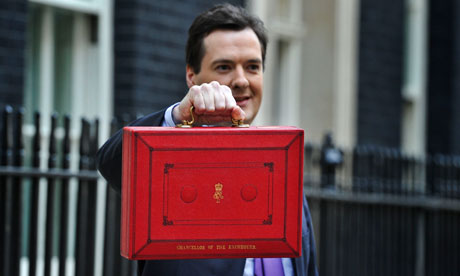
George Osborne has announced a larger-than-expected cut in corporation tax to 22p over the next three years, styling himself as the champion of British business, in a budget which he said would help the country "earn its way in the world".
Osborne made cutting corporation tax, to signal Britain's competitiveness to foreign investors, his first tax-cutting priority. The rate was already due to decline to 25% this year; it will now fall to 24%, and there will be a further two 1p cuts in the years ahead.
Osborne said his statement was "unashamedly" pro business, setting out a battery of supply-side reforms, from simplified planning rules to public funding for ultra-fast broadband, which the Treasury hopes will help to kick-start economic recovery.
"Do we have the national resolve to say, 'no, we will not be left behind, we want to be out in front'?" the chancellor asked, as he announced a government target to double exports to £1tn.
The chancellor announced that the independent Office for Budget Responsibility now expects economic growth to be slightly higher, at 0.8% this year, up from 0.7% in its autumn forecasts. However, next year, it is projecting 2% growth, slightly weaker than the 2.1% it expected in November.
Osborne stressed that he would stick to the government's aggressive austerity programme, which he said had enabled the Treasury to borrow at the cheapest rates in its history.
Announcing the OBR's latest forecasts for the public finances, he said he now expected this year's deficit to be £126bn - just £1bn lower than expected in the autumn, after official figures published earlier on Wednesday revealed a much larger-than-expected shortfall of more than £15bn in February alone.
In future years, the deficit will come down slightly faster than had been previously expected, to £21bn by 2016-17, instead of the £24bn forecast in November. The government's debt will now peak at 76.3% of GDP in 2014-15, insterad of 78%, and will then start to fall.
The growth forecasts formed the backdrop to a highly political Budget statement, in which Osborne announced a series of well-trailed measures, including a controversial cut to the 50p top rate of income tax for those earning more than £150,000 a year.
He clawed back the money lost from lowering the top rate by clobbering buyers of £2m homes with a new 7% stamp duty band.
The latest official snapshot of the public finances, released this morning, left the chancellor with little room for manoeuvre. City analysts had previously expected him to have £5-10bn to spare in the current financial year, 2011-12, because of underspending by Whitehall departments.

